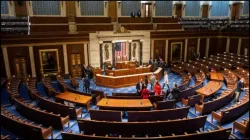'Lecturing India on human rights won't...': Indian-American lawmakers urge constructive talks
Indian-American Congressman Ro Khanna said India was colonised for over 100 years and thus lecturing them on human rights would be unproductive. Meanwhile, other lawmakers like Pramila Jayapal and Shri Thanedar underscored that India remains an important partner of the US.

Washington: A group of Indian-American lawmakers in the US Congress have asserted that they would continue to raise the issue of human rights in India with the leadership, but lecturing the country on human rights would be unproductive and a constructive conversation is needed to share concerns with the Indian leadership. Congressman Ro Khanna highlighted the impact of colonialism that makes India wary of countries lecturing it on human rights.
“India was colonised for over 100 years. So, when we're having a conversation about human rights, and you're having a conversation with (External Affairs Minister) Jaishankar or someone else, you have to understand that just coming in from a perspective of lecturing India. When they say that we've had colonial powers lecture us for hundreds of years is not going to be productive,” he told members of the Indian American community during the “Desi Decides” Summit of Indian American Impact.
“Having a conversation (with India) saying, here are the imperfections in our democracy, what are the imperfections in your democracy, and how do we collectively advance democracy and human rights, I think is a more constructive approach,” Khanna further said. He was joined by the three other Indian American lawmakers, Shri Thanedar, Pramila Jayapal and Dr Ami Bera, during the panel discussion.
'India an important partner of the US'
Agreeing with Khanna, Jayapal said, "We shouldn't lecture, I agree with Ro (Khanna). But we do have to think about all of the United States' interests. That is economic, for sure. India is an important partner for us. It's an important partner because of other regional dynamics as well and global dynamics." She further highlighted that the US should look at what's happening in India the same way it criticises the Chinese government on several issues, but it does not mean not wanting a strong India-US partnership.
Thanedar said he favours a strong India-US relationship. “We need a strong US-India relationship. India historically has been playing both sides, Russia and US. But it's time for India to commit to a strong friendship with the United States, and that's something that I want to work on. The United States has to recognise India's power, its economic power, and India remains the best solution to counteract China's aggression. So, I'm just working on a strong India-US relationship,” he said.
US report on human rights in India
Last month, India sharply criticised a United States report on human rights abuses in India, saying it reflects a "deeply biased and poor understanding" of the country. The 2023 Human Rights Report by the US State Department mentioned "credible reports" of various human rights abuses in India, including the Manipur ethnic violence and "transnational repression" like the murder of Hardeep Singh Nijjar in Canada.
The 2023 Human Rights Report by the US State Department flagged "credible reports" of various human rights abuses in India, including extrajudicial killings, enforced disappearances, harsh prison conditions, arbitrary arrest or detention and transnational repression among others. It also claimed that the Indian government took minimal steps to address the officials who committed the human rights abuses.
It specifically highlighted the Manipur ethnic violence between Kuki and Meitei groups that resulted in the death of at least 175 people. The US State Department cited reports of armed conflict, rapes, and assaults in addition to the destruction of homes, businesses, and places of worship. The report also mentioned the raids by Indian tax authorities on the office of British Broadcasting Corporation (BBC).
"This report is deeply biased and reflects a poor understanding of India. We attach no value to it and urge you to do the same," said Randhir Jaiswal, the official spokesperson of the Ministry of External Affairs.
(with inputs from agencies)
ALSO READ |